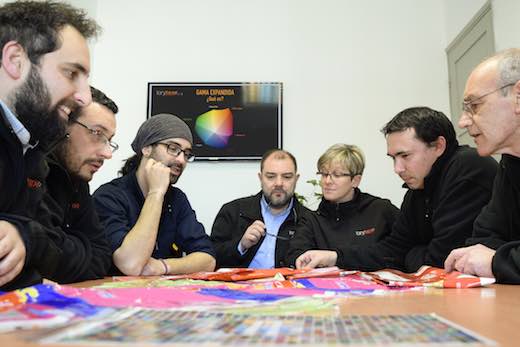Lorytex Strikes Packaging Gold with Flexo and ECG
Press release from the issuing company
“We’re just trying to make flexo a little better every day,” says Roberto Dolinsky, managing director of Lorytex. There’s modesty in the comment, but there’s no doubting his pride in what the company has just achieved — a Gold Award in the inaugural Kodak Global Flexo Innovation Awards. Lorytex was also one of just four “Highest Honors” winners, singled out for creative use of graphic design, production workflow efficiency and a commitment to sustainable print.
What makes the achievement more notable is the fact that Lorytex is a relatively small operation, employing just nine people at its Montevideo base. With a population of 3.5 million, the Uruguayan market too is relatively small, but what it lacks in size it makes up for in competitiveness, says Dolinsky. “As in any other prepress market: you need to have something different, something that make you stand out from the competition.”
In Lorytex’s case, that something is expertise in extended color gamut (ECG) printing. With ECG in the portfolio, the company can respond to the trends and challenges in today’s packaging market, where Dolinsky describes the prevailing conditions as “constant technological change. This is nothing new, of course. Neither are the ever-shorter production runs and tighter delivery schedules. Our strategy is to optimize and automate production, and ECG fits the bill perfectly. With it we can offer something really different to converters — increased productivity, economical handling of short runs, plus the option of combining jobs.”
30% faster turnaround
The award-winning entry, produced for flexible packaging client Ecoflex SA, vividly demonstrated what’s possible with ECG: a turnaround time that was 30% faster, significant savings on ink consumption, plus brand-pleasing image quality and overall visual impact, all achieved on Ecoflex’s press.
Lorytex and Ecoflex have worked together since 2011 and, says Dolinsky, “have closely-aligned objectives.” How close becomes clear when you consider the background to the ECG project, which came about when Ecoflex too sought something to differentiate themselves from competitors — in this case, improved efficiencies, faster deliveries, and genuine innovation.
For Lorytex, the decision signalled the start of a two-year programme to evaluate the potential of ECG and, if things stacked up, implement the technology. “We invested a lot into ECG,” recalls Dolinsky. “Putting the pieces together involved a lot of learning, and a lot of overseas travel for training. We had to be sure we were doing things properly.”
As well as Ecoflex, Lorytex has a close relationship with other converters in Uruguay that are currently evaluating the use of ECG technology because of its proven improvements and cost savings.
Efficient, automated, reliable
“That meant having all the components for the most efficient, automated and reliable set-up possible, including high-quality color management — and, of course, the right plate technology. In fact, investing in the Kodak Flexcel NX solution was the very first decision we made. It’s reliable, fast and gave us the trusted foundation technology around which we could add the other technologies.”
At the end of the process Lorytex developed a series of optimization tests, backed by a detailed methodology, and rolled it out to the client over a two-month period. “We convinced them that factors such as registration and spot colors wouldn’t be issues. It helped a lot that they were totally committed to the project.”
This way of working is typical of the company’s approach, because building close links with customers is central to the Lorytex culture. “In this sense, it helps that Uruguay is a small country,” says Dolinsky. “Over half the population are in and around Montevideo, so we don’t have to travel far to visit customers and prospects! On most projects, we get involved right at the start, at the design stage. This is important with flexo, because the process is new territory for creatives used to working in offset. If we understand what the designer and the brand want the packaging to communicate, we can apply our knowledge of the technology to achieve the best results. We also like to be involved in pre-production meetings with the converters; we learn a lot from them, and they help us have everything in place before production.”
Asked how brands and converters regard flexo, he says the benefits are becoming more widely known, but that there’s still work to be done. “ECG will provide a boost. When we demonstrate how efficient the process is, and the quality results possible, there’s real interest. So much so, that I believe as much as 50% of packaging could be produced using flexo and ECG.”
Find out more at www.miraclon.com.

- Questions to ask about inkjet for corrugated packaging
- Can Chinese OEMs challenge Western manufacturers?
- The #1 Question When Selling Inkjet
- Integrator perspective on Konica Minolta printheads
- Surfing the Waves of Inkjet
- Kyocera Nixka talks inkjet integration trends
- B2B Customer Tours
- Keeping Inkjet Tickled Pink
© 2024 WhatTheyThink. All Rights Reserved.














